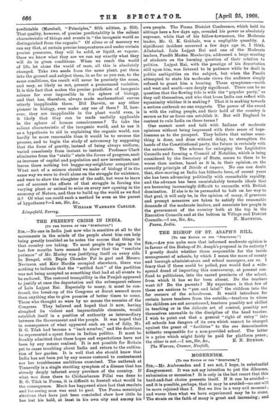THE PRESENT CRISIS IN INDIA.
[TO THE Eorros Or THE "SPECTATOR:1
Sra,—No one in India just now who is sensitive at all to the movements in the minds of the people about him can help being greatly troubled as be notes the course that things in that country are taking. To most people the signs in the last few months have seemed to show that the "resolute patience" of Mr. Morley was justifying itself on every side. In Bengal, with Bepin Chuuder Pal in gaol and Messrs. Nevinson and Keir Hardie occupied elsewhere, there was nothing to indicate that the "settled fact" of the partition was not being accepted as something that had at all events to be endured. The restored tranquillity in the Punjab appeared to justify at once the deportation and the subsequent release of Lela Lajpat Rai. Especially to many, it must be con- fessed, the break-up of the Congress at Surat seemed more than anything else to give promise of better times to come. Those who thought so were by no means the enemies of the Congress. They believed and hoped that it now, having sloughed its violent and impracticable elements, would establish itself in a position of anthority as intermediary between the Government and the people. It was hoped that in consequence of what appeared such an act of folly, Mr. B. G. Tilak had become a "back number," and the doctrines he represented a spent force in Indian politics. It must be frankly admitted that these hopes and expectations have not been by any means realised. It is not possible for Britain yet to cease troubling about India and return to the cultiva- tion of her garden. It is well that she should know that India has not been yet by any means restored to contentment nor her troublesome ambitions exorcised. The outbreak at Tinnevelly is a single startling symptom of a disease that has already deeply infected every province of the country. If what was done there to Chidambaram PilIai was done to B. G. Tilak in Poona, it is difficult to foretell what would be the consequence. Much has happened since last that resolute and far-seeing man was sent to gaol. The Poona municipal elections that have just been concluded show how little he has lost his hold, at least in his own city and among his own people. The Poona District Conference, which held its sittings here a few days ago, revealed his power as absolutely supreme, while that of his fellow-townsman, the Moderate leader, Mr. G. K. G-okhale, was a negligible quantity. A significant incident occurred a few days ago in, I think, Allahabad. Lela Lajpat Rai and one of the Moderate leaders, Pandit Madan Maulaviya, addressed a large meeting of students on the burning question of their relation to politics. Lajpat Rai, with the prestige of his deportation still upon him, was listened to in patience while he dealt in politic ambiguities on the subject, but when the Pandit attempted to state his moderate views the audience simply refused to grant him a hearing. These symptoms—north and west and south—are deeply significant. There can be no question that the flowing tide is with the "popular party," as they call themselves, and who that loves India can reflect with equanimity whither it is making ? That it is making towards a serious outbreak no one suggests. The power of the sword is with the ruling people, and their hold of the country is secure as far as force can establish it. But will England be content to rule India on these terms ?
One cannot meet and talk with Indians of moderate opinions without being impressed with their sense of hope- lessness as to the prospect. They believe that unless some- thing is done, and done without delay, to strengthen the hands of the Constitutional party, the future is certainly with the extremists. The scheme for enlarging the Legislative Councils and forming a Council of Notables, which is being considered by the Secretary of State, seems to them to be worse than useless, based as it is, in their opinion, on the cowardly principle of Divide et impera. No one can doubt that, slow-moving as India has hitherto been, of recent years she has been advancing politically with remarkable rapidity, and the advance has been unmistakably towards ideals that are becoming increasingly difficult to reconcile with British domination. If she is to be persuaded to halt on her way to that goal, it will only be, in the opinion of many, if generous and prompt measures are taken to satisfy the reasonable demands of the moderate leaders, and associate her people in the government of the country both at the top in the Executive Councils and at the bottom in Village and District






















































 Previous page
Previous page